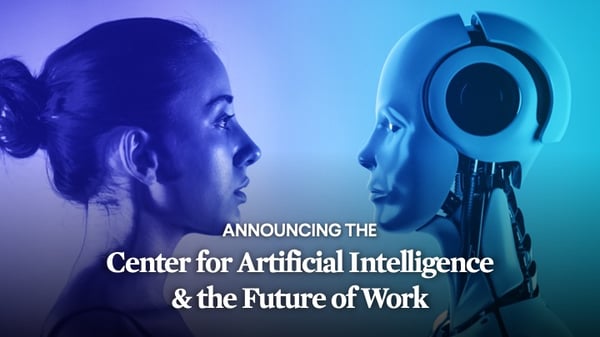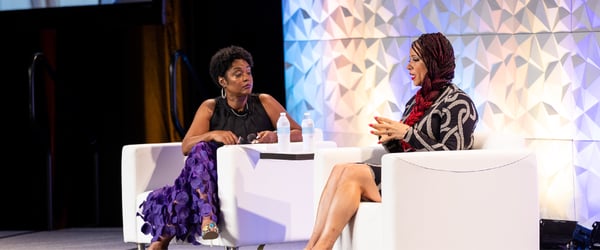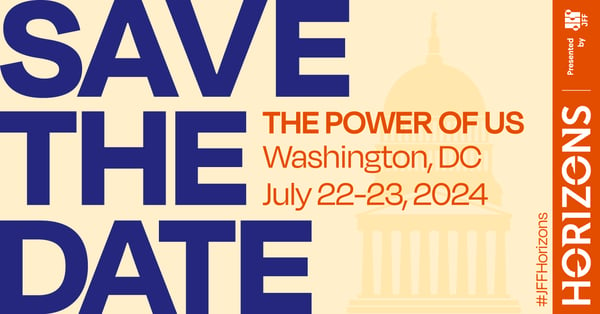6 min read
Building a Future of Work and Learning ‘Without Limits’ at Horizons
![]() Bob Rawson
:
June 27, 2023
Bob Rawson
:
June 27, 2023

At JFF’s 2023 Horizons Summit, workers and learners set ambitious goals for equity and staying on top of an evolving ecosystem.
In 1983, Hilary Pennington and Arthur White launched Jobs for the Future in a car.
Driving around Connecticut, they formed partnerships with employers, government officials, and educational institutions while “trying to imagine what kind of learning and jobs this country needed” to ensure that education and workforce systems could keep pace with labor market trends, Pennington said during a main stage presentation at JFF’s 2023 Horizons summit.
Now executive vice president of programs at the Ford Foundation, she recalled that one of their goals was to develop strategies, models, policies, and systems to create quality jobs and “take away the structural and systemic barriers that keep people from having access to those jobs.”
Forty years later, JFF’s commitment to that goal is stronger than ever, and the organization has set an ambitious objective as a North Star: In 10 years, 75 million people facing systemic barriers to advancement will work in quality jobs.

“This is a really bold goal,” JFF President and CEO Maria Flynn told the 1,500 attendees on the first day of Horizons. “It’s going to take bold thinking and big swings, and none of us can get there alone. We need to work together.”
With that call to action, she kicked off two days of challenging and thought-provoking conversations—plus an exciting announcement about JFF’s new focus area, artificial intelligence and the workforce—on innovative ways to create equitable opportunities for advancement for all learners and workers across the country.
In main stage presentations and spotlight and breakout sessions, speakers and attendees embraced the Horizons theme of exploring “without limits” as they discussed issues that are high priorities for changemakers across the learn and work ecosystem.
One subject that was clearly on the minds of most attendees was artificial intelligence (AI). Others included the importance of expanding access to quality jobs, the need to change the narrative about the impact race and racism have on opportunities for economic advancement, and how to meet the expectations (and follow the lead) of young people from Gen Z and beyond.
Staying On Top of a Fast-Moving Trend
Talk of the impact AI is having on work and learning seemed to come up in just about every conversation, both formal and informal, throughout the two days of Horizons. And with good reason: “There’s basically no job that isn’t affected [by AI],” said Erik Brynjolfsson, a professor and senior fellow at the Stanford Institute for Human-Centered AI and director of the Stanford Digital Economy Lab, in a Day 2 main stage panel discussion about the need to keep ethics at the forefront of AI design.
Derek Thompson, a staff writer at the Atlantic who moderated the discussion, confessed to being “a little bit bored by the state of the conversation about AI” because people seem to fall into one of two camps when they discuss the technology: Those who say, “This is perfect, and it’s going to save the world” and those who say, “We’re all going to die.”
On the whole, Horizons attendees may have stopped short of “it’s going to save the world,” but they seemed to be mostly optimistic about AI’s potential.
“I stay optimistic because we’re in the infancy of this technology,” said panelist Barbara Pender, global and North America generative AI deputy delivery lead at Accenture. “We have the opportunity to bring everybody in. Nobody should be left behind.”
She acknowledged that fears about AI aren’t unwarranted, particularly fears that it will eliminate jobs. Still, if we use AI correctly, she added, it will improve people’s productivity, not replace them.

Several attendees admitted to being surprised by the speed at which generative AI tools gained traction over the past few months, and now JFF is determined to stay on top of this fast-moving trend with a new initiative, the Center for Artificial Intelligence & the Future of Work. Led by JFFLabs Managing Director Alex Swartsel, the new center will promote collaboration among stakeholders throughout the learn and work ecosystem who are interested in exploring AI’s potential for driving equitable economic advancement.
Not Just Jobs—Quality Jobs
Conversations at Horizons revealed that attendees share JFF’s commitment to expanding access to quality jobs: Jobs that not only offer decent pay and basic benefits, but also provide flexibility, autonomy, stability, and equitable opportunities for advancement. Pennington, JFF’s cofounder, recalled that the organization’s early objectives were founded on the belief that “all people have the right to meaningful quality work,” and all workers should be treated as valuable.
“All people have the right to meaningful quality work.”
— Hilary Pennington, Ford Foundation Executive Vice President of Programs and a JFF Cofounder
Abigail Disney, a filmmaker and granddaughter of Walt Disney Company Cofounder Roy Disney, echoed the message from a personal and professional perspective: Her 2022 documentary “The American Dream and Other Fairy Tales” critiques the way her family’s company has treated workers in recent years. She said the low wages and poor working conditions current Disney employees have described run counter to the beliefs her grandfather and great-uncle Walt held when they opened Disneyland.
“It was unacceptable to pay your CEO $65 million in the same year that your employees are trying to decide whether they should buy insulin or food,” she said.
“This is about management looking upon the people who work in those hourly jobs as their equals,” she added. “And therefore valuing their needs and their dignity, the same as you would value the needs and the dignity of your own children and yourself.”
Other Horizons conversations revealed that one way to expand access to quality jobs is to embrace skills-based hiring and remove degree requirements from job postings.
In Maryland, for example, the state government used to have trouble filling jobs because the pool of applicants was artificially limited by a degree requirement, according to former Governor Larry Hogan. But when officials did away with degree requirements, he said, the number of successful hires increased by 41% in one year.
Likewise, results of LinkedIn searches for job candidates increase by a factor of 19 when they look for people with specific skills rather than people who have certain job titles or degrees, according to LinkedIn Chief Economist Karin Kimbrough.
Changing the Narrative to Advance Racial Economic Equity
In a main stage conversation with JFF Vice President Lucretia Murphy, Nikole Hannah-Jones, Pulitzer Prize-winning creator of the 1619 Project and a staff writer at The New York Times Magazine, discussed the lasting economic impact of this country’s legacy of slavery.

Nikole Hannah-Jones responds to a question from JFF Vice President Lucretia Murphy at Horizons. Photo credit: drewbirdphoto.com
“We have all been told a narrative of a country that has never existed,” Hannah-Jones said, explaining that employers, educators, and policymakers need to understand slavery and the policies that prevailed during the period of apartheid known as the Jim Crow era were not just racist systems but also economic systems. They were designed to create “the ultimate exploitable class of labor—people from whom you could take every ounce of their labor, extract every ounce of profit from their labor and redistribute that profit to white people in white institutions.”
In another Horizons conversation, JFF Vice President Michael Collins, who leads the Center for Racial Economic Equity, said one of JFF’s goals is to help create a world where race is no longer a determinant of education and economic outcomes.
To get there, this country must confront the enduring economic damage of slavery and Jim Crow laws, and the top priority may be to address the persistent Black-white wealth gap.
Noting that the wealth gap has remained unchanged since Martin Luther King Jr. died, Hannah-Jones said there’s an urgent need to close that gap because “wealth is the thing that allows you to sustain hardship. It allows you to send your kids to school without burdening them with student loan debt. It allows you to purchase a home.”
Bringing New Voices to the Table

Horizons opened with a nod to JFF’s past, and closed with an eye on the future, and the voices of Generation Z staking a claim to building the education and work systems that lie ahead for them.
At this year’s summit, JFF launched a new initiative called the Horizons Ambassadors program, inviting eight young people navigating the path from high school to postsecondary learning and careers to help plan the event and actively engage in the Horizons experience. The Ambassadors spent their time in New Orleans exploring career interests, networking with attendees, and taking full advantage of the opportunity to join the conversation.
One Ambassador, Toni Dismuke, was invited on stage to join a panel discussion in a spotlight session titled “The Crossroads of the Future of K-12 Education, Higher Ed, and Workforce Development.” As a Gen Zer and recent high school graduate, she said it felt great to be part of the discussion, not just the topic of conversation.
“There’s a lot of conversations about higher education and K through 12 where we’re on the table like a dish everyone’s feasting on, but the second we can jump off the dinner plate and take a seat at the table—that’s like, wow,” she said.
And in a main stage conversation, two other Gen Zers offered insights about what young people bring to the workplace.
Kristy Drutman, founder of Browngirl Green and cofounder of the Green Jobs Board, took issue with the idea that Gen Zers don’t want to work.
“It’s not that people don’t want to work; they just don’t want to work for a company or organization that makes them feel bad about themselves,” she said. “They want to work somewhere where they actually feel included.”
And Jaylen Smith, who at the age of 18 was elected mayor of Earle, Arkansas, in 2022, said he tunes out people who tell him he’s too young.
“I was always told that, but I always continue to press forward because I know that I can make a difference,” he said. “I can make a change in my community.”
Let’s Keep the Conversation Going
Be sure to join us at the next Horizons summit, July 22-23, 2024, in Washington, DC.



